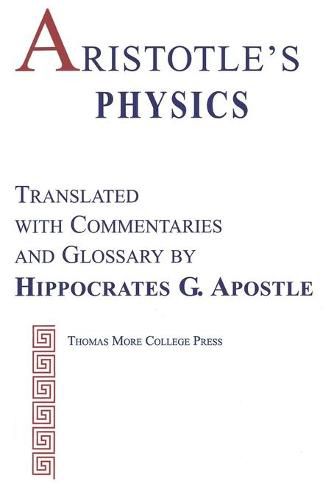Readings Newsletter
Become a Readings Member to make your shopping experience even easier.
Sign in or sign up for free!
You’re not far away from qualifying for FREE standard shipping within Australia
You’ve qualified for FREE standard shipping within Australia
The cart is loading…






Aristotle’s Physics deals with the principles of motion; it discusses nature, causation, chance, necessity, motion and its kinds, infinity, time, place, void, and whatever is necessary for motion. It does not treat its subject mathematically, and, in this respect, it differs from modern physics; but it is universal enough to be applicable to such sciences as biology and psychology, for the principles of the Physics are presupposed by these other sciences.
Aristotle was well aware of applications of mathematics to other sciences, but he used different names for those sciences, e.g., mechanics, optics, astronomy, acoustics, and these taken together hardly differ from modern physics with respect to general subject and treatment. Thus, in his Mechanics, he states that the subject belongs to physics, but the treatment is mathematical.
Hippocrates G. Apostle held that the Physics was written as a science should be, and, for this reason, he translates it accurately and scientifically, with familiar and consistent terminology, a glossary of definitions, and extensive commentaries, thus making the translation readable and understandable
$9.00 standard shipping within Australia
FREE standard shipping within Australia for orders over $100.00
Express & International shipping calculated at checkout
Stock availability can be subject to change without notice. We recommend calling the shop or contacting our online team to check availability of low stock items. Please see our Shopping Online page for more details.
Aristotle’s Physics deals with the principles of motion; it discusses nature, causation, chance, necessity, motion and its kinds, infinity, time, place, void, and whatever is necessary for motion. It does not treat its subject mathematically, and, in this respect, it differs from modern physics; but it is universal enough to be applicable to such sciences as biology and psychology, for the principles of the Physics are presupposed by these other sciences.
Aristotle was well aware of applications of mathematics to other sciences, but he used different names for those sciences, e.g., mechanics, optics, astronomy, acoustics, and these taken together hardly differ from modern physics with respect to general subject and treatment. Thus, in his Mechanics, he states that the subject belongs to physics, but the treatment is mathematical.
Hippocrates G. Apostle held that the Physics was written as a science should be, and, for this reason, he translates it accurately and scientifically, with familiar and consistent terminology, a glossary of definitions, and extensive commentaries, thus making the translation readable and understandable